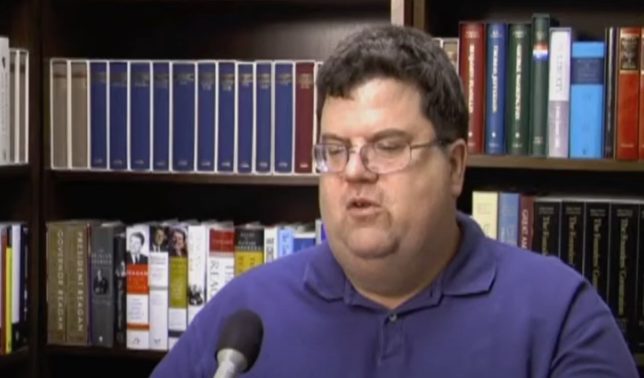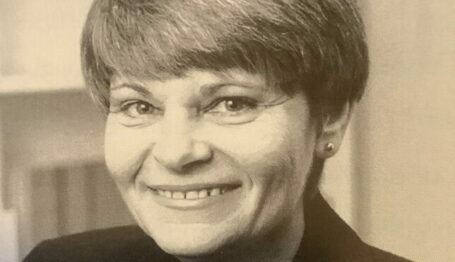Commentary
Martin Morse Wooster, RIP
CRC senior fellow is remembered by friends


Martin Morse Wooster was a longtime contributor to the work of Capital Research Center before his untimely death at the hands of a hit-and-run driver on November 12. In a forthcoming issue of Capital Research magazine, CRC president Scott Walter will detail Wooster’s contributions to CRC and all students of philanthropy. Here we present some remembrances by some of Wooster’s many friends.
Martin Wooster was the indispensable man for many people in Washington. You wanted your manuscript expertly edited? He was your man. You wanted help with a book that didn’t quite jell in your own mind? Martin had your back. Research in arcane fields at the microfiche files at the Library of Congress? Martin had mastered that.
In addition, Martin was a mensch. A kind, always polite soul who never sought the limelight and enjoyed sharing news with friends. Martin had wide interests: he reviewed science fiction books for the Washington Post, he wrote about craft beers, he wrote an expert’s guide to philanthropy for the Capital Research Center, and he expressed pure joy when he discovered something new that no one else had.
I first met him at the National Journalism Center in the 1980s and can’t express how much I will miss him. He was a conservative, but had friends across the political spectrum—a sad rarity in some circles today. He brightened the life of everyone he touched.
—John Fund, a columnist with National Review who was graduated from the National Journalism Center with Martin
I think I met Martin in 1983, when he and John Fund were the Woodward and Bernstein of twenty-something libertarians, but our first lunch was in ‘86 or ‘87 in New York City. He was the messiest eater I’ve ever known. Like many, I regularly received envelopes bearing the Post Office Box 8093 return address. Mine were stuffed with Washington Post and Financial Times articles about Jack Kerouac, the Buffalo Bills, Frank Norris, and Walt Whitman. How he arrived at that quartet I do not know.
He was a patriot of his place (Silver Spring) with a huge heart and wonderfully catholic interests. I hadn’t seen him in quite a while, but about three weeks ago I spoke on a panel in DC and Martin was there in the front row. At the after-event mixer he burst into song, as was his wont—not, as usual, “Hail to the Redskins” but a Barry Goldwater ‘64 campaign number, which he must have felt fittingly inappropriate in a roomful of moderate Republicans and media liberals. He was a good guy, and I’m sad to think I’ll never get another letter from Post Office Box 8093, Silver Spring MD.
—Bill Kauffman, author and longtime colleague
Martin Wooster was one of the very last of the WASP eccentrics. He once told me that he was proud to rent an apartment on land in Silver Spring, Maryland, that, at the time of the American Revolution, his family owned. Wooster College at Yale is also, apparently, named for his family.
He had a talent for striking up unusual friendships, which includes us I guess. He used to perform book research for a British Viscountess, who would tell him, “Martin, you are a star,” whenever he found some unusual document. He would repeat this line to me fairly often, in a mock-British accent. He loved it. He was also friends with a Washington Post editor who won the Pulitzer Prize; Martin would sometimes house-sit for him, other times they would drink beer and talk about books.
When I first met Martin, in 1987, he was the Washington editor of Reason magazine. He was carrying a wicker basket, instead of a briefcase, and wore a tent-like t-shirt in a room of striped Oxford button-downs. He didn’t care.
He was at home being himself.
When I drove Martin home a few times, the neighborhood children would taunt him, “book man! book man!”
Apparently, he took one of them in a few years earlier, when she needed a dry, warm place to wait for her mom. She described Martin’s apartment as piled floor to ceiling with books and newspapers, so his neighborhood nickname was born.
Just a month ago, I received a letter from Martin, full of clippings from the Financial Times and Washington Post about retirements or deaths of CIA officers whom I had quoted in my 2003 book. Martin had remembered them and thought I would want to be kept up to date. It was unexpected, thoughtful, and, because my wife often requires explanations, brought forth a series of stories about Martin, including his unlikely kind acts.
When I was done, she said, “He sounds like he stepped out of a novel.”
—Richard Miniter, CEO of Zenger.news and author of Mastermind: The Many Faces of the 9/11 Architect, Khalid Shaikh Mohammed and other books
Martin took time out of his day(s) to scan the news and set aside for each of us articles he thought we would appreciate. I only worked about 20 months with him—November 1997 to June 1999—but he did the same for me. I’m still honored. What did he send ME you may ask? Any articles on Richard Nixon or anything on Argentina (politics, sports, the latest IMF loan, you name it).
All his friends recognize the manila envelope coming in the mail, from that Takoma Park, Maryland P.O. Box. Clippings not so neatly folded, but all of them dated! The penmanship may not have always been clear, and there may have been a few grease stains on some of them, but the immediate thought that always came to mind (just last week for me) was, Wow, Martin, how thoughtful!
He was just an all-around nice guy, funny as all hell, anything but boring, always curious. He seemed to read EVERYTHING. I think his curiosity sustained him, gave him energy, this lust for knowledge and for obscure facts few cared about but were ultimately intrigued by.
Meals with him (the one thing I occasionally did with him, about every ten years) were always hilarious. Yes, the coupons he always brought, but also the interesting places he recommended. He didn’t care about appearances, especially in a town where sometimes that’s all people care about. But this was his town, and he lived life a way few do. His hunger (for books, information, food, beer, taunting Cowboys fans like Tom Switzer) was one-of-a-kind, and his disposition was unlike anyone I’ve ever known.
RIP Martin. You’re already missed.
—Walter S. Montano, director, Boston University Washington DC Programs
I always enjoyed my conversations with Martin Wooster. He was knowledgeable about so many things, and he always passed along interesting nuggets about my world, the polls. I may have learned more about beer and ale than I ever needed to know from him, but it was always enjoyable to hear about something he loved. He was very proud of the work he did on donor intent, something that benefited all of us. Martin was a very good person, and we will miss him.
—Karlyn Bowman, Distinguished Senior Fellow Emeritus, American Enterprise Institute
Martin Morse Wooster started a peculiar tradition years ago: Whenever he spotted a “John Miller” in the news, he let me know. Early on, he sent clips by regular mail, cut from the pages of his prodigious reading. At some point, the emails outnumbered the stamped envelopes. Along the way, I learned about hordes of people with whom I share a name. They included loads of criminals and at least one person who attended a Star Trek convention as a Klingon. . . .
I met Martin almost exactly 30 years ago. I was new to Washington, D.C., having just graduated from the University of Michigan. I’d seen Martin’s byline in Reason, the libertarian magazine, but now I spotted it in the Washington Post, where he wrote about science fiction. I was a fan of the genre, so I looked him up and proposed that we get dinner. He suggested a particular Chinese restaurant. When we met, he explained that he patronized it because the owners were opposed to the Commies in Beijing. Mostly we talked about books by William Gibson, Neal Stephenson, and the like. When I referred to them as “sci-fi” authors, he corrected me: The preferred reference, he insisted, was “SF.” . . .
Martin and I shared another interest: philanthropy. He devoted much of his professional life to the study of it—and especially to the problem of donor intent, which is to say, the way in which so many foundations have betrayed the visions of the people who started them, often abandoning commitments to free enterprise for collectivism. He wrote articles, research papers, and his books. I covered the field as a journalist, writing for National Review and other publications. We often compared observations and posed oddball questions to each other. Just now, I unearthed this relic of our friendship, when he was searching for the source of a quote. I put it to readers of The Corner, who collectively know everything.
My writing on philanthropy culminated in a book, A Gift of Freedom: How the John M. Olin Foundation Changed America. This gave birth to another of Martin’s habits: Whenever he saw a reference to my book, even as just a footnote, he let me know. The latest arrived a few weeks ago. I think it was Martin’s way of saying that my writing mattered—an act of kindness that might even be a form of philanthropy.
There may be a lot of John Millers out there, but there only ever will be one Martin Morse Wooster.
—John J. Miller, director of the Dow Journalism Program at Hillsdale College, writing at NationalReview.com
On Saturday, November 12th, 2022, longtime Philanthropy Daily contributor, Martin Morse Wooster, was killed in a hit-and-run accident in Williamsburg, Virginia. A true devotee of civil society, Martin was in Williamsburg attending a conference on beer across history.
In addition to writing for Philanthropy Daily, Martin was a senior fellow at the Capital Research Center, and contributed significantly to research on philanthropy and especially the issue of donor intent. Martin’s contributions to questions around philanthropy, charity, and donor intent can scarcely be overstated. How Great Philanthropists Failed remains the leading book on donor intent and the history of failed philanthropic legacies.
Martin’s work has appeared everywhere from the Wall Street Journal and the Washington Post to the Chronicle of Philanthropy, Reason, and numerous other publications.
Martin will be sorely missed by all of us at Philanthropy Daily and countless others who have benefited from his important work.
—The editors, PhilanthropyDaily.com
Martin devoured entire libraries as after-dinner mints, emerging ever more curious about what great work of history, politics, biography, economics, sports, or science fiction (pardon me, “S.F.”) to hoist next. He cherished baseball, exhibits, museums, stage plays, conventions, the science of beer making, free market capitalism, and the United States. He was bogged down neither by car payments nor dependents. He lived richly on a tidy budget, zipped about on public transport, viewed every parade, and devoured each spectacle. When he paid for a movie, he would always—his sister, Ann-Sargent Wooster, informs me—insist on sitting front row. This past October, when his Washington Nationals were eliminated from Major League Baseball’s postseason, Martin was disappointed but was quick to note the cost-savings. “In 2019 my barber, Ricardo,” Martin emailed me, “could afford tickets to the first round of the playoffs. Shail, who owns the apartment building next to mine, could afford the second round. No one could afford World Series tickets.” . . .
Wooster’s most serious long-form contribution is found in his book, The Great Philanthropists and the Problem of “Donor Intent.” The first edition appeared in 1994, the second in 1998, the third in 2007, and the fourth in 2017. As he explained in the Weekly Standard, “Philanthropic history can be entertaining [given] the rise of such heroic entrepreneurs as Andrew Carnegie, John D. Rockefeller, John MacArthur, and Bill Gates [coupled with] … a profession that attracts the overeducated and underemployed, who often fill their many idle hours with memorably vicious office politics.”
The stories are fascinating. Henry Ford was not a perfect man, but “he lived simply and reinvested most of his profits back into his business,” writes Wooster. Ford employed blacks (at equal pay scales) and paid “living wages.” Ford Motor Co. gave criminals a second chance, hiring 500 ex-convicts between 1914 and 1920, “including one convicted of forging the name ‘Henry F. Ford Jr.” on a check. Yet Henry Ford (the real one) did “not believe in charity”—on moral hazard grounds. This view was not radical in the day; Wooster notes that George Bernard Shaw stated the case for tough-love socialism. But it put Henry Ford at odds with many of the policies of the New Deal. And it left the Ford Foundation, which would support just the causes that the man rejected, violating donor intent.
Read the full tribute here.
—Thomas W. Hazett, the Hugh H. Macaulay Endowed Professor of Economics at Clemson University on Reason.com



